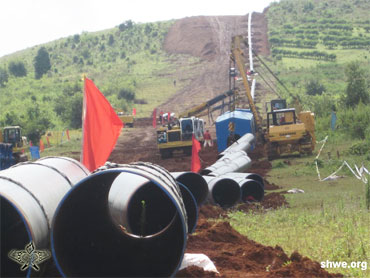The trans-Burma oil and gas pipelines are expected to be completed on May 30, according to Chinese contractor Gao Jianguo, the head of the project under the China National Petroleum Corporation (CNPC), according to a report on Monday by the Chinese national news agency, Xinhua.

“Barring insurmountable barriers, the oil and gas pipelines could begin operating in early June,” Gao is quoted as saying.
The contractor confirmed that the main parts of the Shwe Gas pipeline in Burma have been finished, while those in Chinese territory will be completed this month. The pipelines will then undergo pressure tests and a drying process in February, he said.
The 1,100-km-long oil and natural gas pipelines run from the port of Kyaukphyu in Burma’s Rakhine State and enter China at Ruili in Yunnan Province. They will transfer shipments of crude oil from the Middle East to southern China.
Meanwhile, Xinhua also reported on Monday that a Chinese trade delegation led by Vice Commerce Minister Chen Jian has met with Burmese officials in Burma for trade talks.
Chen is quoted as saying that discussions centered on ways to expand Burma’s agricultural exports to China, as well as addressing the “barriers” to Chinese companies investing in Burma.
The report noted that “several Chinese-funded projects, including a hydropower station and a copper mine, have been abruptly halted or suspended” in recent years.
Chen urged the respective Chinese companies to work towards resolving difficulties, Xinhua said.
In a recent interview with Mizzima, a spokesperson for the Chinese Embassy in Rangoon, Gao Mingbo, said, “Speaking from the point of view of the Chinese companies, when such a giant investment is swept aside it is difficult to accept. After all, there is a contract to honor.”
He emphasized that he believed the Chinese investments in question will benefit the people of Burma.
In September 2011, Burmese President Thein Sein announced a suspension of the controversial Myitsone Dam project, which is located on the confluence of the Irrawaddy River in Kachin State, and which has been partly financed by the China Power Investment Corporation.
Another major Chinese-backed project, the Monywa copper mine in Sagaing Division, is also in jeopardy of being closed down following an incident on November 29 when riot police cracked down on protesters, including dozens of Buddhist monks, who oppose the project on environmental grounds.
An investigation commission, chaired by Burmese pro-democracy icon Aung San Suu Kyi, has been tasked with investigating whether the project will be profitable for the state and for the people, and whether it should be allowed to continue.
The commission is due to submit its report to the President before January 31, 2013.


